
Tunisia’s president has been carrying out a creeping coup, demolishing the country’s hard-fought democratic gains bit by bit. With an economy in turmoil and a splintered opposition, is there anybody that can stop him? Deutsche Welle asks.
President Kais Saied announced he would be taking control of the country’s election commission, the Independent High Authority for Elections, or ISIE, that was established to ensure electoral integrity.
“He took the ‘I’ [for ‘independent’] out of the commission’s name,” Monica Marks, an assistant professor of Middle East politics at New York University in Abu Dhabi and an expert on Tunisia, told DW. “So any elections organized by the ISIE now are going to be unfree and unfair, and will accelerate the consolidation of his [Saied’s] dictatorship.”
Aymen Zaghdoudi at the Institute of Press and Information Sciences in the Tunisian capital, Tunis, told VOA the president’s unilateral posture was like that of an ”autocratic leader.”
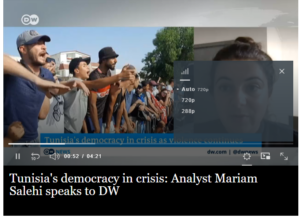 ”Media freedoms are dwindling, freedom of peaceful assembly is being restricted, and the civil space continues to be narrow. We have seen bloggers, lawyers in jail, and they were prosecuted by military courts, and prosecuting civilians in front of military justice is one of the symbols of dictatorship,” he said.
”Media freedoms are dwindling, freedom of peaceful assembly is being restricted, and the civil space continues to be narrow. We have seen bloggers, lawyers in jail, and they were prosecuted by military courts, and prosecuting civilians in front of military justice is one of the symbols of dictatorship,” he said.
Saied’s “creeping coup” has prompted the formation of a new opposition alliance, the National Salvation Front, comprising five opposition parties, including the Islamist Ennahdha party, and five civil society groups, aimed at restoring constitutional normality.
“It’s only the beginning, we plan to keep on consulting with other parties to join the alliance”, said NSF founder Ahmed Nejib Chebbi. “We believe that the social crisis will grow and will have extremely strong repercussions on political stability. To create a (political) force, gathering prominent figures in the country, that offers a plan to return to democracy and save Tunisia, is likely to have support. Anyhow, we have no choice but to take a chance”.
Yet Tunisia’s political parties are “diminished and discredited,” says Youssef Cherif, Director of Columbia Global Centers, “and last year reinforced their evanescence, corroborating the President’s thesis that the opposition is insignificant and lacks any form of popular support.”
“The President’s populist message, blaming the country’s woes on his opponents and foreign conspiracies, keeps him above the political confusion, making him increasingly intolerant of any form of criticism and ultimately consolidating his powers,” he tells ISPI, the Italian foreign policy think-tank. “Over time, he risks becoming a classic authoritarian ruler with negligible checks.”
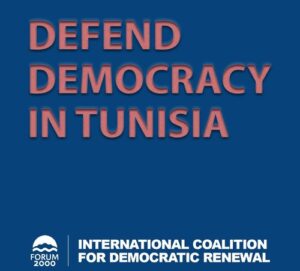
ICDR Statement on the recent anti-democratic actions in Tunisia
In a meeting last week with Samir Saied, the Tunisian Minister of Economy and Planning, USAID Deputy Administrator Isobel Coleman encouraged a swift return to constitutional order and democratic governance, assuring the Tunisian delegation of USAID’s continued commitment to building on investments of more than $685 million in Tunisia’s democracy and economic growth since 2011.
The ongoing instability is indeed likely to escalate, particularly as it intersects with a deep financial crisis and several socio-economic challenges — both aggravated by high commodity prices driven by the war in Ukraine, says the ISPI MENA Centre.
President Saied is currently caught between a rock and a hard place,” adds Hamza Meddeb, Non-Resident Scholar at the Malcolm H. Kerr Carnegie Middle East Center.
“On the one hand, Tunisia’s financial crisis deprives him of the necessary resources to maintain his support base. On the other hand, an agreement with the IMF will require austerity measures, including wage freezes and higher food and energy prices,” he tells ISPI MENA Center. “This is a challenging scenario, considering that the success of his plan to change the Constitution relies on the support of a large population segment that is supposed to vote on the July 25th referendum.”
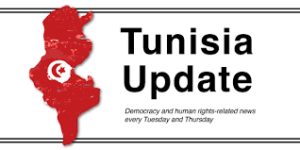
Credit: POMED
Fifty progressive, Islamic and human rights groups sent a letter to Secretary of State Antony Blinken suggesting the U.S. suspend military aid to Tunisia until the North African nation returns to its democratic path, POLITICO reports.
“We call on the Biden administration to [s]uspend U.S. military assistance until Tunisia is on a path towards democracy,” they wrote, and “[w]ork with allies to suspend all non-essential aid, including, immediately, the nearly $500 million Millennium Challenge Corporation compact that requires Tunisia to meet democratic thresholds, until this same condition is met.”
In March, shortly after Saied dissolved Parliament, State Department spokesperson Ned Price said “[a] swift return to constitutional governance, including an elected parliament, is critical to democratic governance, and will ensure widespread and lasting support for needed reforms to help Tunisia’s economy rebound.”
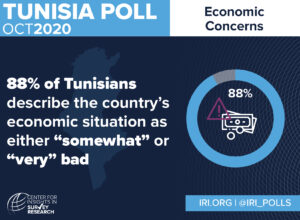 The perception that the power grab is popular has deterred Tunisia’s political parties and its powerful labor union, as well as U.S. policymakers, from coming out more strongly against the July coup, according to Syracuse University researcher Mohamed Dhia Hammami and William & Mary assistant professor Sharan Grewal, a nonresident senior fellow at the Project on Middle East Democracy.
The perception that the power grab is popular has deterred Tunisia’s political parties and its powerful labor union, as well as U.S. policymakers, from coming out more strongly against the July coup, according to Syracuse University researcher Mohamed Dhia Hammami and William & Mary assistant professor Sharan Grewal, a nonresident senior fellow at the Project on Middle East Democracy.
Such public support will also prove essential to pass Saied’s new constitution through a referendum in July, during which he is likely to pursue his vision of empowering the presidency and sidelining political parties. But that support may be thinner and more fragile than it seems, they write for The Washington Post:
Since December, Saied has been able to persuade only a small minority of his supporters to take action on his behalf, whether to take to the streets in pro-government protest, to participate in online consultations about the new constitution, or to vote in local elections. This suggests that Saied’s supporters might be better termed a “silent majority,” unwilling to take
action beyond passive support.
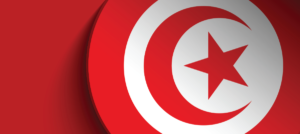
POMED
Since last summer, Saied has taken control of the country’s judiciary, shut down its parliament and dismissed its prime minister, then appointed a new one, as well as increasingly jailed or persecuted opponents. The 64-year-old now rules Tunisia by decree, DW adds.
“What we are seeing is democratic backsliding,” said Hamza Meddeb, a non-resident scholar at the Carnegie Middle East Center and an assistant professor at the South Mediterranean University in Tunis. “It could eventually end in a sort of authoritarian regime. This is not the case today but might be in the coming months.”
“Under the best scenario, Saied will become convinced to open up to political elites and the UGTT [labor union] when economic and social problems emerge because things could get too chaotic,” said Tarek Kahlaoui, a political analyst. “This could lead to a new political system that is perhaps more presidential but with checks and balances,” the Financial Times reports.
On the other hand….
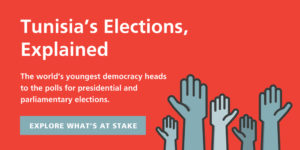
Carnegie
Saied’s latest moves represent “a hazard the country cannot afford,” according to Alessia Melcangi at the Università La Sapienza. “This authoritarian drift could alienate his popular support base and, above all, assistance from the West, already ruffled by Tunisia’s moderate diplomatic response to the Russian invasion. The crisis in Ukraine could be the straw that breaks the extremely fragile Tunisian camel’s back while dark clouds loom on the horizon.”
There are growing signs that Tunisians are beginning to see through the president’s promises. There have been few pro-Saied rallies of late, Bloomberg’s Bobby Ghosh adds:
Few people have cared to participate in the online “national consultation” process that he said would inform the new constitution. And the UGTT leaders have finally roused themselves to threaten a national strike, although their grievance has less to do with his accumulation of power than with the prospect of IMF-decreed economic reforms, including reduced spending on subsidies and public sector wages.
Saied’s assault on the Tunisian state has created a political vacuum that is antithetical to any coherent economic reform strategy, argues Daniel Brumberg, Director of Democracy and Governance Studies at Georgetown University. The threat of an economic meltdown might open some space for the UGTT to mobilize Tunisians behind a real national dialogue. But for this to happen the UGTT leaders must decide between prioritizing the union’s specific social interests and embracing a more national political agenda, he writes for the Arab Center Washington DC.
International actors still have a role to play in shaping the country’s political trajectory, observers suggest.
 The EU and its member states can encourage Tunisia to return to its democratic path by making clear that they will only endorse a dialogue as legitimate if all mainstream political forces participate in it, and that the country needs to hold an election before revising the constitution, argues Anthony Dworkin, Senior Policy Fellow at the European Council on Foreign Relations.
The EU and its member states can encourage Tunisia to return to its democratic path by making clear that they will only endorse a dialogue as legitimate if all mainstream political forces participate in it, and that the country needs to hold an election before revising the constitution, argues Anthony Dworkin, Senior Policy Fellow at the European Council on Foreign Relations.
Europeans should also make clear that they would see attempts to prosecute MPs for conspiring against state security as a serious violation of the rule of law, he observes. If Saied continues to reject an inclusive political process, Europe and Tunisia’s other external partners will face a choice about whether to withhold assistance or oppose an IMF agreement.
“Western democracies cannot say they have no part in what Tunisia has become if they keep indulging Saied and ignoring his abuses,” says analyst Seifeddine Ferjani. “If Western countries won’t take a stand against the dismantling of Tunisia’s democracy, they must ready themselves for the inevitable consequences.”
#Tunisia #Future of 🗣#Democracy
77.9% of registered voters polled were worried about the future of democracy and human rights in the country (the rate was 42% on 3rd august few days after 25 july 2021) #InsightsTN #Poll 10-16feb2022 pic.twitter.com/ugCSbJ3Abh— Insights TN (@InsightsTn) April 11, 2022







